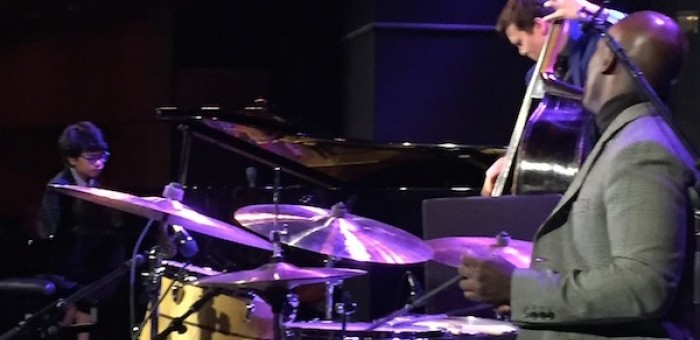Jan 13, 2026 2:09 PM
More Trump-Kennedy Center Cancellations
The fallout from the renaming of the John F. Kennedy Center for the Performing Arts to include President Donald…

Joey Alexander (left), Dan Chmielinski and Ulysses Owens Jr. celebrate the release of Countdown in New York on Sept. 30.
(Photo: Brian Zimmerman)In June, piano wunderkind Joey Alexander hit a milestone: He became a teenager. And while it may be difficult to square up this landmark in a year of major accomplishments—in February, his debut album, My Favorite Things, was nominated for a Grammy, as was his improvised solo on “Giant Steps”—it’s certainly worth taking note.
Teenage-hood, awkward as it may be, is among the most important of life’s intersections, a place in which ambition and experience are often at odds. For a pianist of Alexander’s composure—immensely talented, incredibly young, disarmingly genuine—it can also be vastly transformative.
It’s impossible to ignore the changes that Alexander, 13, has undergone in the past couple of years. But they were made a bit more obvious when he appeared at Dizzy’s Club Coca-Cola on Sept. 30, in celebration of his new album, Countdown (Motéma).
Appearing with his trio—featuring Ulysses Owens Jr. on drums and Dan Chmielinski on bass—Alexander, who cut a sharp figure in a fitted blue jacket and checkered shirt, addressed the crowd with a voice that was deeper and more engaged that it has been in the past. It rang with the authority of a routine practitioner. “Thank you all for coming out to see us on this rainy night,” he said, casually. “It’s been a while.”
Relative to his age, the duration of “a while” can encompass a lot of development. Alexander is noticeably taller than when he made his sensational debut on the scene in 2014, appearing as a doe-eyed child next to trumpeter and mentor Wynton Marsalis at a Jazz at Lincoln Center gala. His limbs are lankier, too, his stance more confident.
Other changes are acoustic, and in fact, it’s his piano playing that reveals just how much he has matured. Two years on the scene seems to have both sharpened Alexander’s skills and mellowed his understandably youthful desire to prove himself. He has become, for the most part, comfortable onstage. One could even say that Alexander has begun to cultivate a style.
At the very least, there is an identifiable shape to the young pianist’s sound, one that favors soft, watercolor chords in the right hand and punchy bass lines in the left. Such was certainly the case on the set’s opener, a version of Herbie Hancock’s “The Sorcerer” that interspersed moments of soaring, headlong flight with relaxed swing.
The latter idiom seems especially cozy for Alexander, who often alights upon the swing feel with calm, gratified ease, as if touching down after a long flight. During solos, as on “Chelsea Bridge,” his phrases lagged playfully behind the beat, tugging on the sleeve of Owens’ persistent rhythm.
As a soloist, Alexander’s language is still very much informed by the hard-bop pianists he idolizes (Horace Silver and McCoy Tyner come to mind), but he’s far from a mere imitator. Rather than borrow the vocabulary and diction of these two piano giants, Alexander seems to have drawn upon their elocution and sense of expression—evoking, for example, their crisp yet fluid articulation, or their percussive agility.
He’s a player of steadfast energy, but yields his power nicely. His blistering solo on “Giant Steps,” a song with which he is swiftly becoming identified, made waterfalls out of small, cascading lines, while his playing on “Sunday Waltz” pursued a soothing gospel feel, nodding to hard-bop’s roots in the church.
During unaccompanied sections—a dramatic schism in “Giant Steps” brought the song to a cavernous standstill—he artfully suspended time to trace the outlines of the song’s harmonic form, insinuating, rather than insisting upon, the tune’s structure.
In combination, these traits point to a pianist who has spent the past two years refining his technique while enlarging his jazz lexicon. But the showcase at Dizzy’s revealed something more. In performance, Alexander seemed confident enough in his own abilities to remove himself from the spotlight, and could therefore direct the entirety of his focus toward interacting with Chmielinski and Owens as a unit. Through careful exchanges with his bandmates, he proved himself not just a fine player but a good listener as well.
Not that he has reached the summit yet. Understandably, Alexander sometimes had to simplify his phrases so that they wouldn’t interfere with the group’s solidifying energy. Eventually, he will learn to sustain a high level of individualism even while weaving his lines into the workings of his bandmates.
But the fact that this young pianist would prioritize group sound over personal demonstration was telling—and perhaps the greatest display of maturity all night.

Belá Fleck during an interview with Fredrika Whitfield on CNN.
Jan 13, 2026 2:09 PM
The fallout from the renaming of the John F. Kennedy Center for the Performing Arts to include President Donald…

Peplowski first came to prominence in legacy swing bands, including the final iteration of the Benny Goodman Orchestra, before beginning a solo career in the late 1980s.
Feb 3, 2026 12:10 AM
Ken Peplowski, a clarinetist and tenor saxophonist who straddled the worlds of traditional and modern jazz, died Feb. 2…

The success of Oregon’s first album, 1971’s Music Of Another Present Era, allowed Towner to establish a solo career.
Jan 19, 2026 5:02 PM
Ralph Towner, a guitarist and composer who blended multiple genres, including jazz — and throughout them all remained…

Rico’s Anti-Microbial Instrument Swab
Jan 19, 2026 2:48 PM
With this year’s NAMM Show right around the corner, we can look forward to plenty of new and innovative instruments…

Richie Beirach was particularly renowned for his approach to chromatic harmony, which he used to improvise reharmonizations of originals and standards.
Jan 27, 2026 11:19 AM
Richie Beirach, a pianist and composer who channeled a knowledge of modern classical music into his jazz practice,…